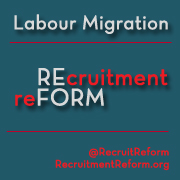Labour migration recruitment reform has been at the top of the agenda for migrant workers, migrant civil society organizations and trade unions for many years. The recruitment process in labour migration poses particular challenges for effective regulation, and gaps in current regulatory practices, both in countries of origin and destination, result in increased risk for migrant workers. The effectiveness of government regulatory regimes is often hindered by a general lack of enforcement and monitoring. Online recruitment through unregulated websites is becoming increasingly common, often providing prospective migrants with inaccurate information upon which to base their migration decisions.
While governments have acknowledge the need for enhanced mechanisms, efforts to effectively implement the measures has proved to be insubstantial in bringing about the much needed reforms to alleviate the gross exploitation of migrant workers. Problems on unlawful recruitment practices continue to arise in the recruitment procedures despite the existing laws and policies proscribing such acts.
Recruitment reform was among the key points identified in the CSO 5 year proposal for an action plan and follow up to the 2nd UN High Level Dialogue on Migration and Development (UNHLD) in 2013.The five year proposal states:
Identification or creation, and implementation, of effective standards and mechanisms to regulate the migrant labour recruitment industry, an outcome that civil society is convinced is within reach, thanks to a growing convergence towards reform among countries of origin, transit and destination, and among private sector actors and funders as well as NGOs, trade unions and migrants themselves. Benchmarks could include a global synthesis of existing recruitment problems and solutions, national or transnational; a global convening of legitimate private recruitment actors; development of a compact on reducing abuses in the recruitment field, etc.
Recognizing the global scope of this issue and understanding that civil society groups have been advocating for recruitment reform in various regions of the world for many years, Migrant Forum in Asia (MFA) and the Global Coalition on Migration (GCM) held a series of meetings on recruitment during the Civil Society Days of the Global Forum on Migration and Development and the parallel People’s Global Action on Migration, Development, and Human Rights in Stockholm, Sweden in May 2014. Among the outcomes of these meetings was the decision to establish the Open Working Group on Labour Migration & Recruitment, with MFA serving as the secretariat with funding from the European Commission via the Migration and Development Network (MADE) Project of the International Catholic Migration Commission (ICMC).
In line with the following up on the discussions and deliberation of the working group at the 7th GFMD, a regional conference on recruitment reform is being convened from 15-16 December 2014 to develop and strategize for a campaign on labour migration recruitment reform. The conference will be part of the Migration and Development (MADE) network initiatives, and is co-organized by Migrant Forum in Asia, Tamkeen Fields for Aid, and the Global Coalition on Migration.
In preparation for the regional conference a survey will be conducted that will aim to identify the gaps and challenges in recruitment process. The results and analysis of the survey will be presented during the conference and will be the basis for identifying key issues for the campaign on recruitment reform.
